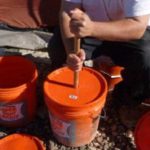
Eating various critters in the wild is a great way to enhance protein and nutrient intake. However, there are also some drawbacks to consider as you are hunting for your next non-traditional dinner. Let’s examine the benefits and concerns that exist so that you can maximize this opportunity while reducing health risks.
The Bad
Snakes, lizards, frogs and insects are just a few examples of critters that can carry and transmit a host of diseases. They are bacteria magnets, and many can contain toxins from eating contaminated food as well. This is particularly true if they live and feed in or near polluted areas. While killing off bacteria and microorganisms is relatively easy, it’s almost impossible to remove toxins from the meat of critters, even if they are thoroughly cooked. You should always avoid consuming any form of food that is sourced from areas that may contain pollutants. Check the overall appearance and health of the local “ecosystem” before indulging in the bounty of food choices that may be present in the area.
Handle With Care
You should treat all non-traditional forms of food like you would meat, fish or poultry products. Make sure that you gut any animal that you find before washing and cooking thoroughly. With the exception of the heart and sometimes liver, most internal organs are loaded with harmful bacteria. The slimy skin or mucous membranes of certain critters should be removed as well prior to cooking and consumption.
You also want to minimize the chances of cross-contamination by washing your hands, cutting boards, knives and any other thing that you used while preparing the meat. You should also either immediately consume the product or store it appropriately. You can wrap and keep most meats in the refrigerator for a couple of days, or wrap them properly and freeze them for a few weeks to a couple of months. Chances are that if you are eating wild critters for food, then you will be eating them right away, but it’s important to know the importance of storing them properly just in case.
Insects do not need to be gutted in most cases, but you should wash them whenever possible. The easiest way to do this is by boiling them in water for a few minutes to kill off any bacteria, fungi or other microorganisms that may pose a health risk. Then you can cook them according to your preferences and enjoy.

Focus on the Meat
Desperate people in many countries will eat almost anything, from the marrow in chicken bones to unhatched ducklings or wild rats. Chances are that if you can find one lizard or snake, then you can find more. It’s always better to prepare and focus on the meaty parts of animals and critters than the organs, bones, skin or layers of fat. Simply catch more of what you want to eat and invest the time to harvest the meaty parts.
Avoid blood. There are a lot of home remedies that have been floating around for centuries as to the benefits of consuming the blood of critters. However, doing so can also bring you into contact with lots of contaminants that can make you very sick. Don’t take the chance, and make sure that you thoroughly clean, rinse and cook the meat before eating.
Critters provide an excellent source of nutrition, and many taste surprisingly decent. However, you should take care to avoid eating uncooked meat, or consuming critters that don’t look healthy. Feel free to experiment with different seasoning and cooking methods, but always remember to handle the meat with care and properly clean up afterwards.














